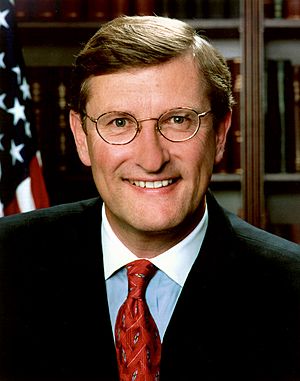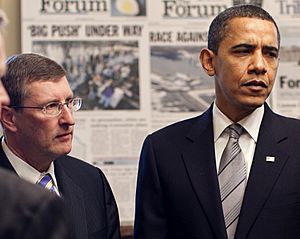Kent Conrad facts for kids
Quick facts for kids
Kent Conrad
|
|
|---|---|

Official portrait, c. 1990s
|
|
| United States Senator from North Dakota |
|
| In office December 14, 1992 – January 3, 2013 |
|
| Preceded by | Jocelyn Burdick |
| Succeeded by | Heidi Heitkamp |
| In office January 3, 1987 – December 14, 1992 |
|
| Preceded by | Mark Andrews |
| Succeeded by | Byron Dorgan |
| Chair of the Senate Budget Committee | |
| In office January 4, 2007 – January 3, 2013 |
|
| Preceded by | Judd Gregg |
| Succeeded by | Patty Murray |
| In office June 6, 2001 – January 3, 2003 |
|
| Preceded by | Pete Domenici |
| Succeeded by | Don Nickles |
| 19th Tax Commissioner of North Dakota | |
| In office January 6, 1981 – December 2, 1986 |
|
| Governor | Allen Olson George Sinner |
| Preceded by | Byron Dorgan |
| Succeeded by | Heidi Heitkamp |
| Personal details | |
| Born |
Gaylord Kent Conrad
March 12, 1948 Bismarck, North Dakota, U.S. |
| Political party | Democratic (D-NPL) |
| Spouse |
Pam Schafer
(divorced)Lucy Calautti
(m. 1987) |
| Children | Jessamyn Conrad |
| Education | Stanford University (BA) George Washington University (MBA) |
| Signature |  |
Gaylord Kent Conrad (born March 12, 1948) is a former American politician. He served as a U.S. Senator for North Dakota. He is a member of the Democratic Party. First elected to the Senate in 1986, he was a leader on the Senate Budget Committee for 12 years.
On January 18, 2011, Conrad announced he would not run for reelection in 2012. He wanted to focus on solving the nation's budget problems. Another Democrat, Heidi Heitkamp, was elected to take his place.
Today, Conrad helps lead a group called the Bipartisan Policy Center's Commission on Retirement Security and Personal Savings. He also works with other groups focused on government spending.
Contents
Early Life and Education
Kent Conrad was born in Bismarck, North Dakota. He was raised by his grandparents. He went to school in Bismarck and also attended high school in Tripoli, Libya. Later, he graduated from Phillips Exeter Academy.
He continued his education at Stanford. He also earned a Master of Business Administration (M.B.A.) degree from The George Washington University.
Family Life
Kent Conrad has been married twice. His first wife was Pam Schafer. They have a daughter named Jessamyn. Jessamyn Conrad wrote a book about politics.
On February 14, 1987, Conrad married Lucy Calautti. She was his campaign manager when he ran for Senate in 1986.
Start of Political Career
After college, Conrad worked for the government. He was an assistant to the North Dakota State Tax Commissioner, Byron Dorgan. Dorgan later became a fellow Senator with Conrad.
Conrad first tried to enter politics in 1976 but did not win. In 1980, he became the Tax Commissioner for North Dakota, taking over from Byron Dorgan. He held this job until 1986, when he ran for the U.S. Senate.
Serving in the U.S. Senate
Kent Conrad served as a U.S. Senator for North Dakota for many years. He was known for his work on important committees.
Committee Roles
As a Senator, Conrad was part of several key committees:
- Committee on Agriculture, Nutrition, and Forestry
- Committee on the Budget (He was the chairman of this committee for some time.)
- Committee on Finance
- Committee on Indian Affairs
- Joint Committee on Taxation
Key Political Ideas
In 2006, Time magazine named Conrad one of "America's 10 Best Senators." He was praised for his deep understanding of money and economic issues. He often used charts to explain things when speaking in the Senate, earning him the nickname "Godfather of Charts."
Conrad supported Barack Obama in the 2008 Democratic presidential race. He was also part of a group called the "Gang of 10." This group pushed for more offshore drilling for energy.
Healthcare Views
During discussions about healthcare reform in 2009, Conrad did not support a "public option." This was a plan for the government to offer health insurance.
Money and Budget Views
Conrad was known for understanding money and budget issues very well. He called himself a "deficit hawk," meaning he wanted the government to spend less and balance its budget. He supported help for family farmers.
He also supported lower taxes for middle-class families. However, he wanted higher taxes for people earning more than $1 million a year. Conrad often spoke out against the spending policies of the George W. Bush administration. He believed these policies increased the national debt.
Foreign Policy and Safety
In 1991, Conrad voted against using military force in Iraq. He was one of only 23 senators who voted against the 2002 resolution for the Iraq War. He initially supported the USA PATRIOT Act, but later opposed some parts of it, like warrantless wiretapping.
Senate Elections
Kent Conrad had a notable career in Senate elections.
Election Overview
In the 1986 election, Conrad won against the Republican Senator, Mark Andrews. Andrews had been a federal representative for North Dakota since 1963.
During his 1986 campaign, Conrad promised he would not run for reelection if the federal budget deficit had not significantly decreased by the end of his term. By 1992, the deficit had not fallen. Conrad kept his promise and did not run for his seat again. Byron Dorgan won the Democratic primary for that seat.
However, Conrad had another chance to serve in the Senate. North Dakota's other Senator, Quentin Burdick, passed away on September 8, 1992. A special election was held to fill the rest of his term. Conrad decided to run for this special election and won. He was sworn in on December 14, 1992.
Even though North Dakota often votes Republican, Conrad was reelected easily in 1994. This was a year when many Republicans won seats in Congress.
1986 Election
- Kent Conrad (D-NPL) 50%
- Mark Andrews (R) (inc.) 49%
1992 Special Election
- Kent Conrad (D-NPL) 63%
- Jack Dalrymple (R) 34%
1994 Election
- Kent Conrad (D-NPL) (inc.) 58%
- Ben Clayburgh (R) 42%
2000 Election
- Kent Conrad (D-NPL) (inc.) 61%
- Duane Sand (R) 39%
2006 Election
- Kent Conrad (D-NPL) (inc.) 69%
- Dwight Grotburg (R) 30%
- Roland Riemers (I) 1%
- James Germalic (I) 0.6%
Images for kids
See also
 In Spanish: Kent Conrad para niños
In Spanish: Kent Conrad para niños
 | Selma Burke |
 | Pauline Powell Burns |
 | Frederick J. Brown |
 | Robert Blackburn |


